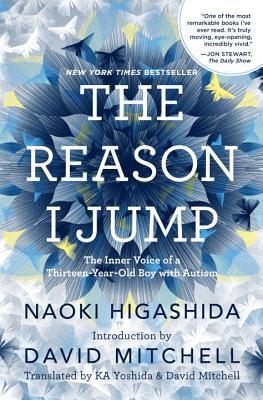The Reason I Jump by Naoki Higashida
Publisher: Random House
Publishing Date: Aug. 27, 2013
176 Pages
Format: hardcover, borrowed
Synopsis
You've never read a book like The Reason I Jump. Written by Naoki Higashida, a very smart, very self-aware, and very charming thirteen-year-old boy with autism, it is a one-of-a-kind memoir that demonstrates how an autistic mind thinks, feels, perceives, and responds in ways few of us can imagine. Parents and family members who never thought they could get inside the head of their autistic loved one at last have a way to break through to the curious, subtle, and complex life within.
Using an alphabet grid to painstakingly construct words, sentences, and thoughts that he is unable to speak out loud, Naoki answers even the most delicate questions that people want to know. Questions such as: "Why do people with autism talk so loudly and weirdly?" "Why do you line up your toy cars and blocks?" "Why don't you make eye contact when you're talking?" and "What's the reason you jump?" (Naoki's answers: "When I'm jumping, it's as if my feelings are going upward to the sky.")With disarming honesty and a generous heart, Naoki shares his unique point of view on not only autism but life itself. His insights—into the mystery of words, the wonders of laughter, and the elusiveness of memory—are so startling, so strange, and so powerful that you will never look at the world the same way again.
In his introduction, bestselling novelist David Mitchell writes that Naoki’s words allowed him to feel, for the first time, as if his own autistic child was explaining what was happening in his mind. “It is no exaggeration to say that The Reason I Jump allowed me to round a corner in our relationship.” This translation was a labor of love by David and his wife, KA Yoshida, so they’d be able to share that feeling with friends, the wider autism community, and beyond. Naoki’s book, in its beauty, truthfulness, and simplicity, is a gift to be shared.
My Review
I heard about this books months ago, and since then, I've wanted to read it. Not too long after that, I was blessed to have C, a 3-year-old autistic boy, come into my life. As I started to get to know him, I wanted to read this book that much more. I've been patiently waiting to get a copy from my library, and finally did last week. I put down the book I was reading at the time to jump right into this one. I had really high hopes for it; not only because I had heard it was so good, but because I wanted to learn a little more about what was going on in his mind.
Unfortunately, this book didn't live up to my expectations. I didn't enjoy it nearly as much as I hoped to, and struggled to finish it. I just didn't feel like I got that insight I was looking for. I found the author over generalized way too much. Instead of just answering how or why he did things, he would say "people with autism" do this because... or feel this way because...etc. Just like "normal" developing people, those with autism are very different from one another and no one has the exact same experiences or needs. One of the questions he was asked was why he liked water so much. He went on to state that people with autism want to go back to a "distant past." I was so confused when I read this. Can't it just be that they like how the water feels? They just like swimming? I don't think everyone wants to go back to a distant past... Another question was about why people with autism can't stay still and always have to be moving. He answered with he feels like his soul is detaching itself from his body. I'm not sure about you, but that's one of the strangest answers I've heard. I'm not saying that's not how he feels, maybe it is. But I don't think you can say that's exactly how everyone with autism feels.
This book felt forced for some reason. I'm not sure I can explain how or why, but that's how it felt to me. I don't like how everything was about "people with autism." I wish it had been more about his experiences, why he felt that way, rather than trying to explain everyone with this disorder.
To be honest, if you're looking for a book to explain autism, I felt Carly's Voice by Arthur and Carly Fleishmann was much better. It's mostly told from the father's point of view, but Carly often explains why she does things the way she does. I thought it was a much better explanation of what it's like to be autistic. I'm disappointed this book didn't live up to what I was expecting, but that's okay. To some people, this is exactly what they were looking for, and I'm glad for them. But for me, it just wasn't helpful.


No comments :
Post a Comment